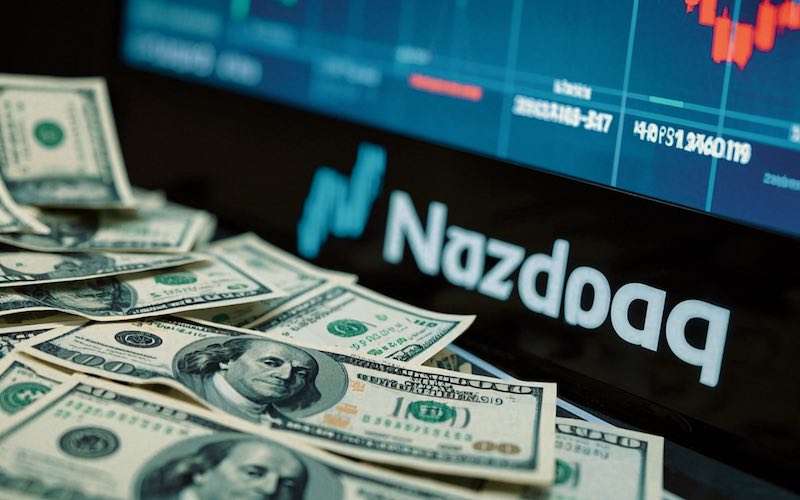November 6th Financial Breakfast: Gold prices benefited from safe-haven buying, oil prices hit a two-week low, and the probability of Trump winning the US tariff debate decreased.
2025-11-06 07:33:32

Key Focus Today
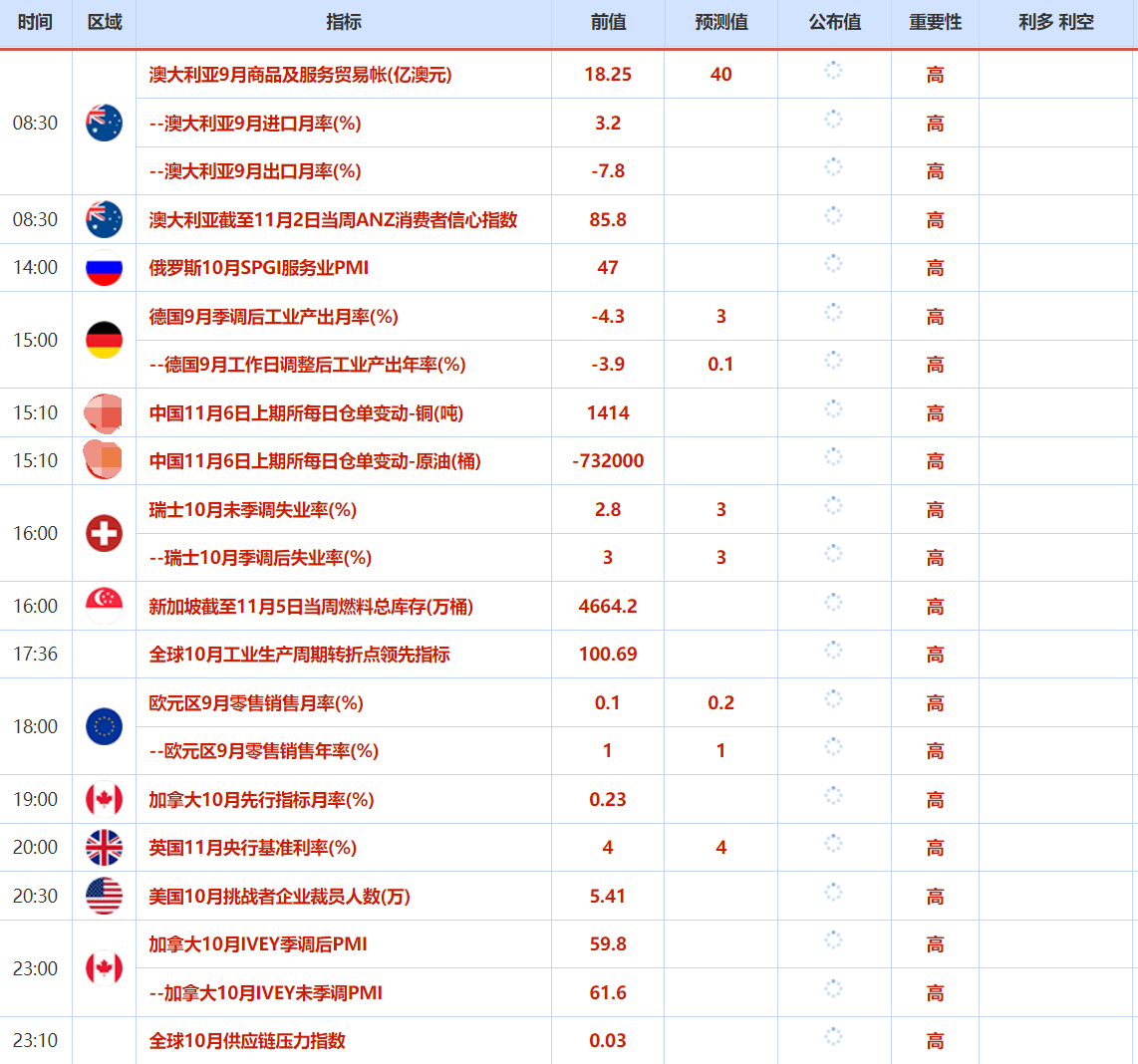
stock market
U.S. stocks rebounded across the board on Wednesday after a sharp sell-off on Tuesday. Optimistic corporate earnings and better-than-expected economic data eased investor concerns about technology stock valuations, pushing the three major indexes higher. The Dow Jones Industrial Average rose 0.48%, while the S&P 500 and Nasdaq Composite gained 0.37% and 0.65%, respectively.
Despite JPMorgan CEO Jamie Dimon's warning that overvalued asset prices have slowed the rally, the market still views the previous sell-off as a healthy correction.
ADP's national employment report showed that private sector jobs rebounded in October, adding 42,000. However, the labor market still showed signs of weakness, with some industries continuing to lay off workers. Another report indicated that the U.S. service sector was still expanding, but faced job losses and the highest input costs in nearly three years.
The congressional gridlock led to the longest government shutdown in history, forcing investors and the data-dependent Federal Reserve to rely on data compiled by the private sector to assess the economic situation.
In terms of individual stocks, McDonald's rose 2.2% due to better-than-expected same-store sales driven by promotional activities; Bank of America fell 2.0% despite raising its profit target; and Supermicro plunged 11.3% due to weaker-than-expected earnings.
Analysts point out that 83% of S&P 500 companies have exceeded earnings expectations, with third-quarter profits growing by 16.2% year-on-year, far surpassing initial quarterly forecasts. Coupled with the traditional year-end rally expectations, investors are adopting a "buy the dip" mentality towards short-term volatility.
Gold Market
Despite strong U.S. ADP private sector employment data, gold prices rose significantly, driven by safe-haven buying. Spot gold rose 1.3% to settle at $3,983.89 an ounce, while U.S. gold futures for December delivery also rose 0.8% to settle at $3,992.90.
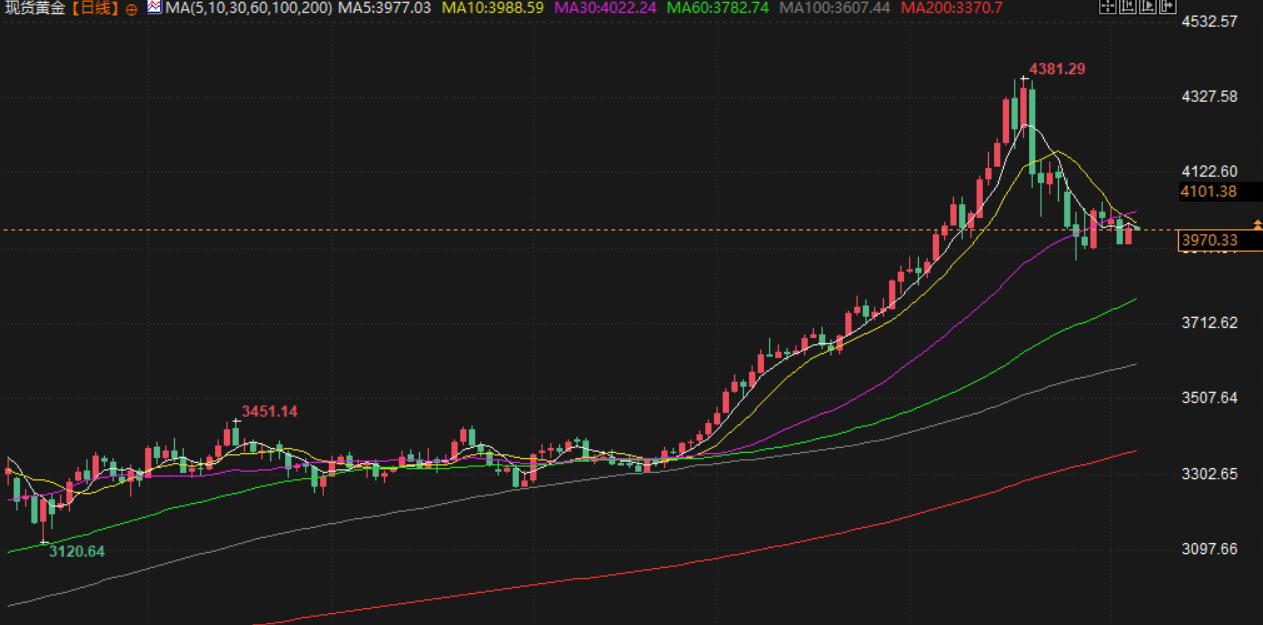
Market analysts point out that while strong employment data typically implies higher interest rates for an extended period, global stock market volatility and concerns about an AI stock bubble have combined to fuel safe-haven demand. Traders say that gold's rise despite stronger-than-expected employment data has reassured bulls.
Meanwhile, precious metals such as silver, platinum, and palladium all rose, with gains of 2.2%, 1.7%, and 2.4%, respectively. Investors are closely watching the U.S. Supreme Court hearing on the legality of Trump's tariffs, a move that will bring new policy uncertainty to the market.
The U.S. Supreme Court began oral arguments on Wednesday regarding the legality of President Trump's massive retaliatory tariffs. In addition to the Supreme Court's liberal justices, several conservative justices also questioned the legality of Trump's tariffs. Chief Justice John Roberts stated that Trump's tariffs are taxes on Americans, which has always been a core power of Congress. Of the three justices appointed by Trump during his presidency, Neil Gorsuch and Amy Coney Barrett also raised challenging questions and explored the arguments of those opposed to the tariffs.
oil market
Oil prices continued their decline on Wednesday, with Brent crude and U.S. crude falling 1.43% and 1.59% respectively to settle at $63.52 and $59.60 per barrel, both hitting their lowest closing prices in two weeks. Continued concerns about a global oil supply glut were the main factor suppressing prices.
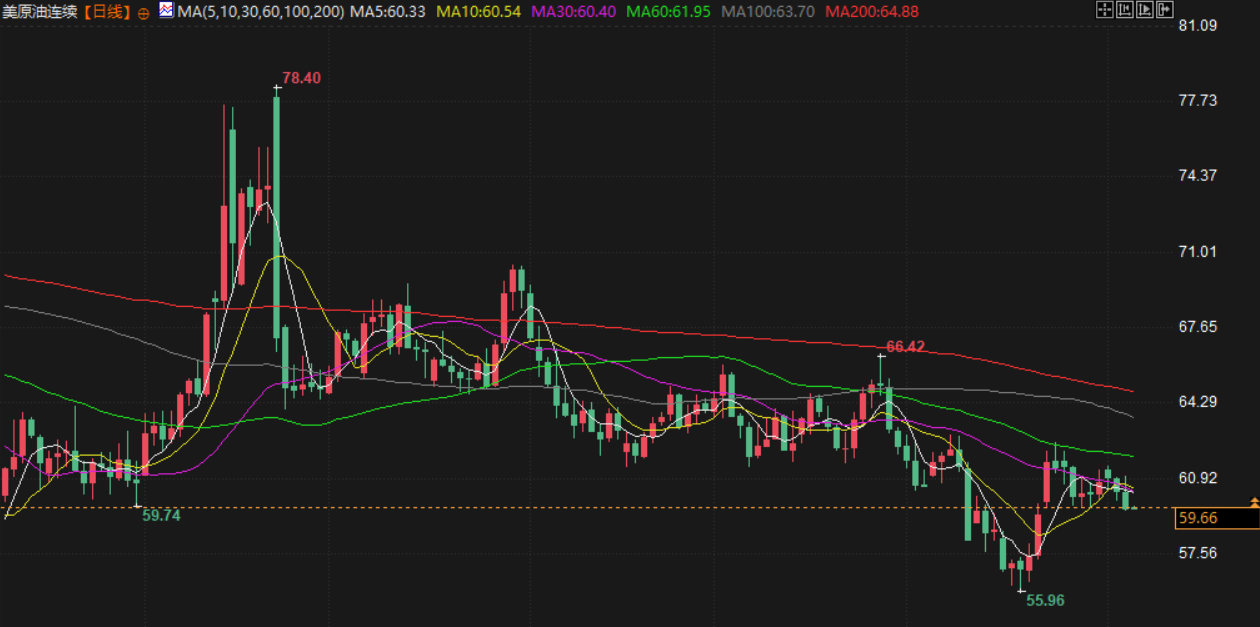
Data from the U.S. Energy Information Administration showed that crude oil inventories unexpectedly increased by 5.2 million barrels last week, far exceeding market expectations of 603,000 barrels, reflecting the dual pressures of weak refining activity and a rebound in imports. However, strong demand signs, such as a sharp drop of 4.7 million barrels in gasoline inventories, somewhat mitigated the decline in oil prices.
Geopolitically, the suspension of fuel exports from Russia's Tuapse port due to a Ukrainian drone attack, coupled with the possibility of the Canadian government lifting its emissions cap on oil and gas, have collectively exacerbated market expectations regarding the supply landscape.
Canadian Prime Minister Mark Carney's budget plan, unveiled Tuesday, suggests Canada may remove emissions caps on oil and gas, exacerbating market concerns about a potential supply glut. Furthermore, the Russian Black Sea port of Tuapse has reportedly suspended fuel exports, and its refineries halted crude oil processing following Sunday's Ukrainian drone attacks on its infrastructure.
Foreign exchange market
The dollar remained near a five-month high against a basket of currencies on Wednesday, supported by strong economic data. The dollar index was essentially unchanged at 100.16, maintaining its highest level since late May.
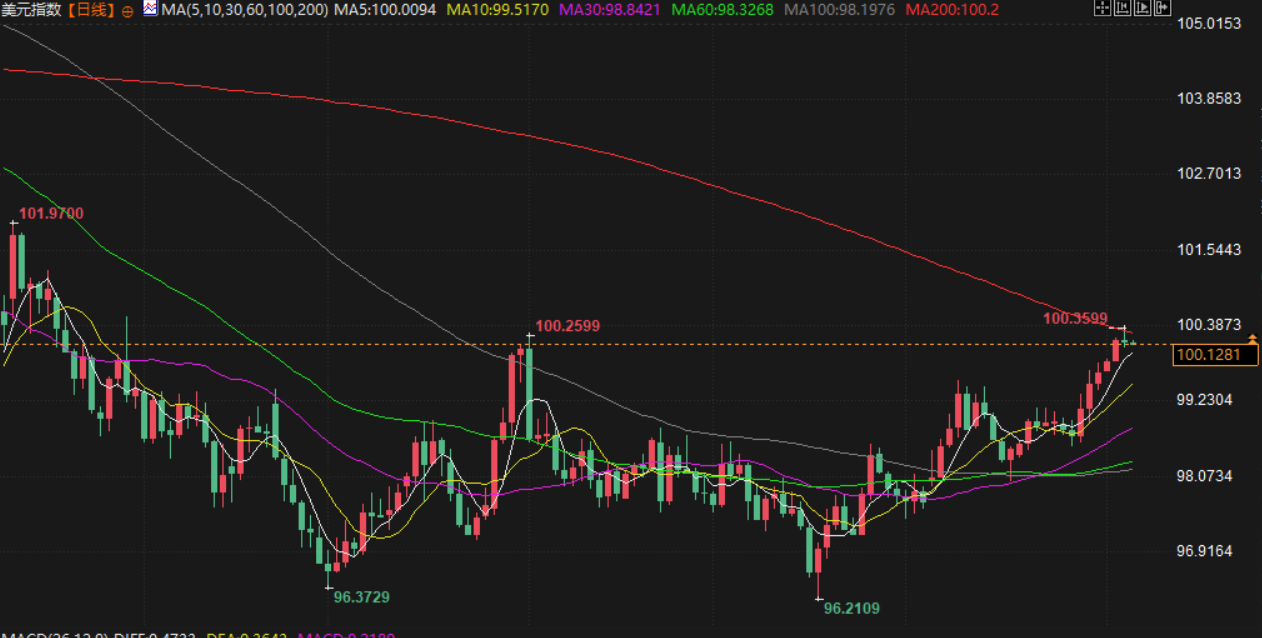
Data showed that U.S. private sector jobs increased by 42,000 in October, far exceeding expectations, while service sector activity also showed signs of recovery, easing market concerns about an economic slowdown. Strategists pointed out that the strong labor market data weakened the case for aggressive monetary easing, and investors are reassessing the interest rate outlook.
Risk sentiment improved during the session, with the risk-sensitive Australian dollar rebounding 0.3%, while the safe-haven Japanese yen gave back its earlier gains.
Markets are closely watching the US Supreme Court hearing on the legality of Trump's tariffs, a move that could reshape the global trade and exchange rate landscape. The pound has found some respite after recent weakness, with markets awaiting interest rate decisions from the Bank of England and the Central Bank of Norway.
International News
Progress in the US Supreme Court tariff case debate: Trump's chances of winning have decreased.
The U.S. Supreme Court began oral arguments on Wednesday regarding the legality of President Trump's massive retaliatory tariffs. In addition to the Supreme Court's liberal justices, several conservative justices also questioned the legality of Trump's tariffs. Chief Justice John Roberts stated that Trump's tariffs are taxes on Americans, which has always been a core power of Congress. Two of Trump's three appointed justices, Neil Gorsuch and Amy Coney Barrett, also raised challenging questions and delved into the arguments of those opposed to the tariffs. The Supreme Court has a conservative majority, 6-3. The Supreme Court is expected to announce its decision in December. The latest prediction from Polymarket gives Trump a 27% chance of winning, down from 40% before the arguments and briefly dropping to a new low of 18% during the hearings.
The Bank of Canada will cut 10% of its staff as Prime Minister Carney seeks to reduce spending in his fall budget report.
A memo reveals that the Bank of Canada plans to cut 10% of its workforce, affecting approximately 225 employees, in response to Prime Minister Mark Carney's (former Governor of the Bank of Canada and the Bank of England) call for reduced government spending. The layoffs will take place over the next few months and be completed by the end of June 2026. This is part of the bank's efforts to achieve its goal of reducing budget costs by 10% by the end of 2026. The bank is also committed to achieving 15% budget cuts between 2026 and 2028 and has pledged a further 5% reduction in corporate spending by the end of 2028.
Russian President Vladimir Putin: If the US resumes nuclear testing, Russia will take reciprocal countermeasures.
On May 5th local time, Russian President Vladimir Putin convened a Federal Security Council meeting to discuss issues including the United States' intention to resume nuclear testing. Putin received reports from Defense Minister Oleksandr Belousov, Chief of the General Staff of the Russian Armed Forces Gerasimov, and others. Putin stated that if the United States or other signatory states to the Comprehensive Nuclear-Test-Ban Treaty conduct nuclear tests, Russia will take reciprocal countermeasures. Putin instructed the Ministry of Foreign Affairs, the Ministry of Defense, special agencies, and relevant institutions to conduct an assessment and submit a coordinated proposal. (CCTV News)
The European Council reached an agreement on amending the European Climate Law.
The European Council announced on May 5 that member states had reached an agreement on amending the European Climate Law and formed a position paper. The Council also approved updated EU and member state emissions reduction targets for 2035. According to the document, the Council maintained the European Commission's medium-term climate target—a 90% reduction in net greenhouse gas emissions from 1990 levels by 2040. This position paper will serve as the basis for subsequent trilateral talks between the Council and the European Parliament. The European Parliament will formulate its own position, and the European Commission, the Council, and the European Parliament will consult on the final legislative version. The Council also introduced emissions reduction measures, such as allowing member states to offset up to 5% of their 1990 emissions reduction targets by purchasing international carbon credits from 2036 onwards, and allowing member states to flexibly allocate resources across different sectors and policy tools to address shortfalls in individual sectors without affecting overall progress. (Xinhua)
ADP employment growth stronger than expected, but weak employment growth in small businesses raises concerns.
ADP reported Wednesday that U.S. private sector job growth in October was slightly stronger than expected. The trade, transportation, and utilities sectors added 47,000 jobs, offsetting job losses in several other sectors. While artificial intelligence fueled a boom in the tech industry, the information services sector lost 17,000 jobs. Other sectors experiencing job losses included professional and business services, other services, and manufacturing, which continues to struggle despite President Trump's efforts to bring factory jobs back to the U.S. through tariffs. All new jobs came from companies with at least 250 employees, with this category adding 76,000 positions, while small businesses lost 34,000. ADP Chief Economist Nera Richardson stated that small businesses account for three-quarters of all jobs, making their weak job growth a concern and contributing to the sluggish economic recovery. Despite limited job growth, wages continued to rise. Annual salaries for retained employees increased by 4.5% year-over-year, unchanged from September; salaries for those who changed jobs rose by 6.7%, slightly higher than the previous month.
Russian Deputy Foreign Minister says conditions are not yet ripe for a meeting between Russian and US leaders.
Russian Deputy Foreign Minister Sergei Ryabkov stated on May 5th that the necessary conditions for a summit between Russian President Vladimir Putin and US President Donald Trump have not yet been met. Ryabkov pointed out that any such high-level summit requires thorough preparation and careful consideration of all issues. He acknowledged that several conditions for organizing the Putin-Trump summit have not yet been met, but emphasized that the foreign ministries of both countries are continuing their work on this matter.
US Transportation Secretary: Capacity at 40 major US airports to be cut by 10%
On May 5th local time, U.S. Transportation Secretary Duffy confirmed that capacity at 40 major U.S. airports would be reduced by 10%. Duffy had previously warned that if the government shutdown continued, the Department of Transportation might be forced to close some airspace to cope with staff shortages and aviation safety pressures. The United States has long faced a shortage of air traffic controllers, and many air controllers were already forced to work overtime before the government shutdown. Since the federal government shutdown, approximately 13,000 air traffic controllers and about 50,000 employees responsible for airport security have been forced to work without pay, and the number of employees taking sick leave is steadily increasing.
Domestic News
The 8th Hongqiao International Economic Forum held a sub-forum on "International Standards for Artificial Intelligence Empowering Industrial Upgrading".
On November 5th, the "International Standards for Artificial Intelligence Empowering Industrial Upgrading" sub-forum of the 8th Hongqiao International Economic Forum was held at the National Exhibition and Convention Center (Shanghai). Shu Wei, Vice Minister of the State Administration for Market Regulation, and Chen Jie, Vice Mayor of Shanghai, attended the sub-forum and delivered speeches. At the sub-forum, Javier Garcia, Vice President of the International Organization for Standardization (ISO), Gilles Solnet, Deputy Secretary General of the International Electrotechnical Commission (IEC), Guo Xu, Academician of the Chinese Academy of Sciences, Lewis, former Director General of the European Telecommunications Standards Institute (ETSI), and representatives from well-known domestic and international companies such as Huawei, Siemens, ZTE, and OPPO delivered speeches and participated in panel discussions on the theme of "International Standards for Artificial Intelligence Empowering Industrial Upgrading." The sub-forum also released three achievements: the foreign language versions of national standards such as the "Large-Scale Model of Artificial Intelligence," an international cooperation initiative on artificial intelligence standards, and the English version of the "2025 Research Report on Ethics and Review Evaluation of Artificial Intelligence Technology." (State Administration for Market Regulation)
Vice Minister of Commerce Sheng Qiuping: China's economic and trade relations are deeply integrated into the global economy, and the reputation of investing in China continues to shine.
At the "Finance Supporting Global Economic and Trade Development" sub-forum of the 8th Hongqiao International Economic Forum held on the afternoon of November 5th, Sheng Qiuping, Vice Minister of Commerce, stated that in the first three quarters of 2025, total retail sales of consumer goods reached 36.59 trillion yuan, and are expected to exceed 50 trillion yuan for the whole year. Imports reached approximately 20 trillion yuan, further solidifying China's position as the world's second-largest consumer and import market. Looking at the international market, goods trade grew by 4%, services trade grew by 7.4% in the first eight months, China's share of the international export market rose to 14.2% in the first half of the year, and the proportion of imports and exports to countries participating in the Belt and Road Initiative rose to 51.7%. Newly established foreign-invested enterprises increased by 16.2%, further enhancing China's reputation as a leading investment destination. Outward non-financial direct investment grew by 4.8%, maintaining its position among the top three globally. More and more Chinese enterprises are going global to participate in global expansion and engage in global supply chain cooperation. China's economy and trade are becoming increasingly integrated into the global economy.
- Risk Warning and Disclaimer
- The market involves risk, and trading may not be suitable for all investors. This article is for reference only and does not constitute personal investment advice, nor does it take into account certain users’ specific investment objectives, financial situation, or other needs. Any investment decisions made based on this information are at your own risk.




















